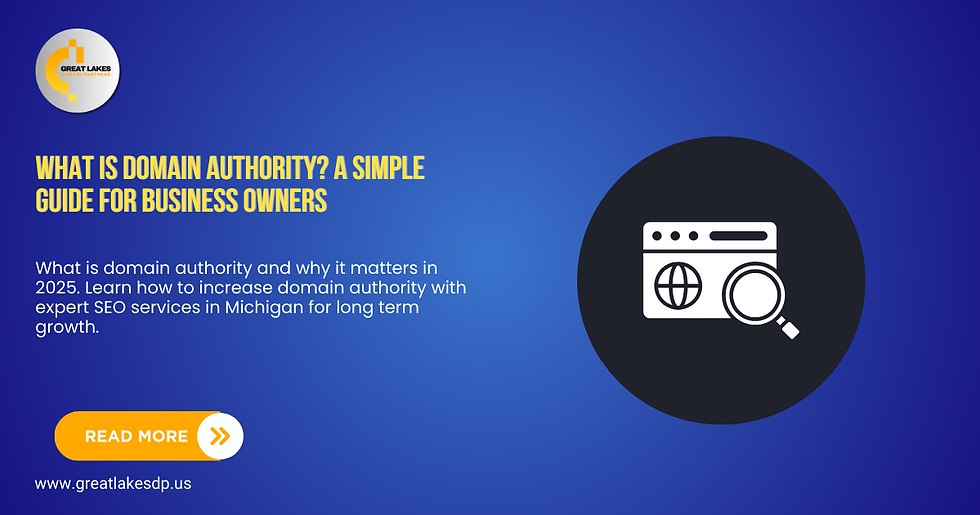What Is Technical SEO? Basics and Best Practices
- Great Lakes
- Jul 28, 2025
- 4 min read

In the fast-changing world of search engines, Technical SEO is what makes or breaks your site’s ability to rank. Great content can only go so far if your site is slow, hard to crawl, or poorly structured. In 2025, search algorithms reward websites that are lightning-fast, mobile-optimized, and technically sound. That’s why understanding technical SEO is no longer a “nice-to-have,” it’s a must.
Whether you're running a blog, e-commerce store, or corporate site, investing in technical SEO ensures your website gets discovered, crawled, and indexed properly. Let's explore how to build a strong foundation and stay ahead of algorithm updates.
What Is Technical SEO?
Technical SEO refers to the backend work that optimizes your website for search engines. It includes actions that improve crawlability, page load speed, site structure, security, and mobile performance. While on-page SEO focuses on content, technical SEO ensures that content can actually be found, read, and ranked by search engines.
In 2025, search engines are increasingly powered by AI and user experience signals. That means your site must be not just readable, but fast, secure, and logically structured to rank well.
Key Elements of Technical SEO in 2025
Here are the critical components every website owner should monitor and improve:
1. Website Speed and Core Web Vitals
A fast-loading website is essential. Google’s latest benchmarks show that 53% of users abandon pages that take longer than 3 seconds to load. Tools like PageSpeed Insights and Lighthouse are your best friends.
2. Mobile Optimization
With mobile-first indexing now fully implemented, your site must look and function perfectly on smartphones. Use responsive design and test using Google's Mobile-Friendly Test.
3. XML Sitemaps and Robots.txt
These files guide search engines on what to crawl and what to ignore. Ensure your robots.txt is not blocking important pages and that your sitemap.xml is regularly updated.
4. Secure Website (HTTPS)
Security matters. Websites without HTTPS see lower rankings and user trust. Install an SSL certificate and redirect all traffic to the secure version.
5. Structured Data
Use Schema Markup to help search engines understand your site’s content. This increases your chances of appearing in featured snippets and rich results.
How to Do a Technical SEO Audit
Knowing how to do a technical SEO audit is key to fixing hidden issues that could be holding your site back.
Step-by-Step Guide:
Crawl your site using Screaming Frog or Sitebulb.
Check indexing status via Google Search Console.
Monitor Core Web Vitals through PageSpeed Insights.
Review mobile usability and responsiveness.
Fix 404 errors and redirect broken links.
Validate structured data using Google’s Rich Results Test.
Check for duplicate content and apply canonical tags.
Ensure HTTPS is applied across all pages.
Running a full audit at least once a quarter is among the best technical SEO practices for staying competitive.
What is Technical SEO and why is it important?
Technical SEO is the process of optimizing a website’s backend infrastructure to help search engines crawl and index it efficiently. It improves speed, security, and visibility, making it crucial for ranking higher on search engines in 2025.
Best Technical SEO Practices for 2025
Want to future-proof your website? Follow these best technical SEO practices:
Optimize for mobile and Core Web Vitals.
Regularly audit your site using modern SEO tools.
Implement structured data on service and product pages.
Ensure fast load times with compressed images and clean code.
Fix broken links and redirect chains.
Submit XML sitemaps after every major update.
If you're looking for SEO Services in Michigan, make sure your agency has a strong technical focus, not just content-based strategies.
Why Work with an SEO Agency in Michigan?
Partnering with an experienced SEO Agency in Michigan means your website gets the full package: technical SEO, content strategy, and performance tracking. They’ll keep your site aligned with Google’s latest updates, manage Core Web Vitals, and ensure smooth crawling and indexing.
CTA: Great Lakes Knows Technical SEO Inside and Out
At Great Lakes, we don’t just offer SEO, we engineer it. Our experts specialize in Technical SEO, helping Michigan businesses create fast, secure, and crawl-friendly websites that rank. Whether you’re launching a new site or want to audit an existing one, we deliver insights and results that move the needle.
FAQs
1. Is technical SEO more important than content SEO? Not necessarily, but it’s foundational. Without technical SEO, your content may never be seen. Both work together to help you rank higher and retain traffic.
2. How long does it take to see results from technical SEO improvements?
Depending on the issue, some fixes (like site speed) can show results within days, while others (like crawl budget optimization) may take weeks or months to reflect in rankings.
3. What tools are essential for technical SEO?
Use a mix of tools like Google Search Console, PageSpeed Insights, Screaming Frog, GTmetrix, and Ahrefs for a comprehensive view of your technical SEO performance.
4. Can small websites benefit from technical SEO?
Absolutely. Even simple blogs or local business sites need technical SEO to ensure visibility. A fast, mobile-friendly site builds trust and increases traffic.
5. What happens if technical SEO is ignored?
Your website may experience issues like poor indexing, slow loading times, security vulnerabilities, and a drop in search rankings over time.











Comments